介绍
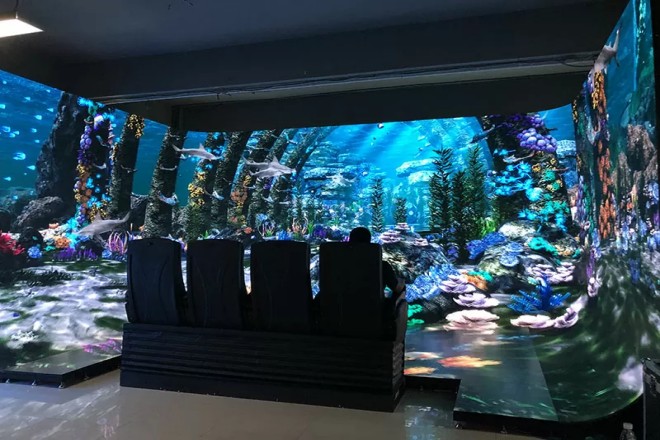
进入未来娱乐新时代, LED显示屏 引领着沉浸式主题公园变革的潮流。
想象一下,行走在奇幻的光影世界里,每一步都引发一场惊艳的视觉盛宴,仿佛穿越时空,体验电影里的梦幻场景。这不仅仅是科幻电影里的幻想,更是LED显示技术与沉浸式体验完美融合的现实写照。
本文将直入核心,为大家揭秘LED显示屏如何重塑主题公园,从技术原理到创意设计,从成功案例到未来趋势,充分展现这一创新组合如何为游客带来前所未有的沉浸式享受。
1. 沉浸式主题公园概述
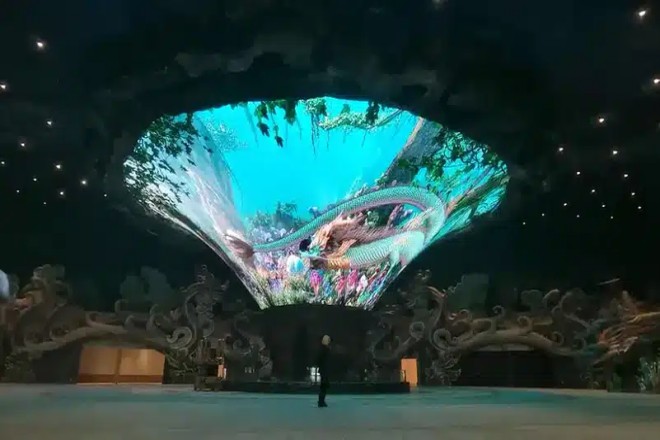
简而言之,沉浸式主题公园就是让游客完全沉浸在特定的主题世界中的娱乐场所。
在这个公园里,从建筑外观到室内装潢、从游乐设施的设计到员工的服饰,每一个细节都围绕着特定的主题,让游客仿佛来到了另一个世界。
1).沉浸式主题公园的特点主要体现在以下几个方面:
主题:乐园通常围绕一个或多个特定主题进行设计和布局,如童话世界、未来科技、历史文化等,每个主题都有自己独特的故事情节和背景设定。
沉浸感:乐园通过高科技手段、多感官体验,营造强烈的沉浸感,让游客仿佛置身于真实的主题环境中。
互动性:相较于传统主题公园,沉浸式主题公园更加注重游客的参与性和互动性,游客可以通过完成任务、与角色互动等方式深度体验主题故事。
文化性:公园在展现主题的同时,还融入了丰富的文化内涵,让游客在游玩的同时感受到文化的熏陶。
2).沉浸式体验的核心要素:视觉、听觉、触觉等多感官融合
沉浸式体验的核心在于多感官的融合,即通过刺激游客的视觉、听觉、触觉等感官,营造全维度、立体的体验。
视觉:通过LED显示屏、3D投影、全息投影等技术,创造出逼真的虚拟场景,让参观者仿佛置身于另一个世界。这些场景不仅高度逼真,还会根据参观者的动作和反应而动态变化。
听觉:利用环绕声、立体音响系统,营造身临其境的声音体验。音效不仅与视觉场景相契合,还能通过声音的变化引导参观者的动作和情绪。
触觉:通过触觉反馈设备、体感游戏等方式,让参观者触摸虚拟世界中的物体,感受到真实的触感。这种触觉反馈不仅增强了沉浸感,还能让参观者更深入地理解主题故事。
此外,一些沉浸式体验还运用了嗅觉(如模拟花香、食物香气)、味觉(如特色小吃、主题餐厅)等感官元素,进一步增强了游客的沉浸感和参与感。
2、LED显示屏在沉浸式主题公园的深度应用
1). 技术基础详解
1.1).LED显示屏的工作原理:
LED显示屏,简单来说就是由无数个发光二极管(LED)排列组合而成,每一个LED都是一个微小的光源,通过控制这些光源的亮灭、颜色变化,就能显示各种图像和信息。
这些LED被封装成特定的模块或者像素单元,通过驱动电路和控制系统来显示图像。
1.2). 技术参数及其重要性:
- 明晰:
清晰度决定了图像的精细程度,像素间距越小,单位面积像素数量越多,图像越清晰。在沉浸式体验中,高清晰度保证了图像细节丰富,让参观者仿佛置身于真实场景之中。
亮度决定了显示屏在不同光照条件下的可见度。无论是在户外还是在明亮的光线环境下,高亮度的显示屏都能确保图像清晰可见。
在沉浸式体验中,高亮度显示屏可确保游客即使在强光下也能欣赏到清晰的图像。
- 对比:
对比度是指显示器最亮部分和最暗部分之间的亮度差异。
高对比度可以提供更丰富的色彩层次和更逼真的图像效果,在沉浸式体验中,高对比度可以增强图像的立体感和真实感,让参观者感受到更加真实的场景。
2). 交互体验设计深度解析
- 步行交互的实现:
在沉浸式主题公园中,LED显示屏可以与传感器技术相结合,实现行走互动,当游客走过时,传感器会捕捉游客的脚步,并触发相应的动画效果。
例如在模拟海底世界的场景中,当游客走过时,脚下的LED显示屏会呈现出波光粼粼的海水效果,仿佛真的行走在海底。这种互动体验不仅增加了游客的参与感,也提升了整个场景的趣味性。
- 嵌入式地面LED屏与传感器动画的结合:
嵌入式LED地面屏是将LED显示屏嵌入地面的技术,通过与传感器技术结合,可以实现更加丰富的互动效果。
例如在模拟森林探险的场景中,当游客踩上地面的LED屏幕时,屏幕就会呈现出树叶飘落、溪水流淌等动画效果,仿佛真的置身于森林之中。
这样的组合不仅给游客带来了视觉的享受,也增加了游客的沉浸感和参与感。
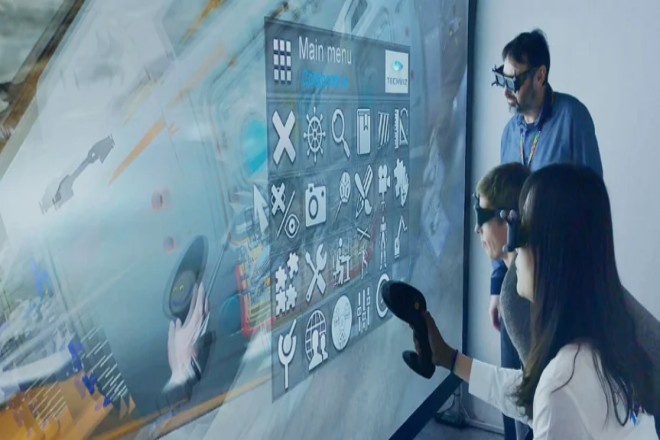
- 虚拟现实(VR)与LED幕墙的结合:
虚拟现实(VR)技术是一种可以模拟现实环境的技术,将VR技术与LED幕墙相结合,可以创造出更加真实、身临其境的体验,游客佩戴VR设备后,可以置身于LED幕墙的环境中。
LED幕墙可以显示VR场景中的背景和环境,而VR设备则以第一人称视角提供沉浸式的体验。
例如在模拟飞行体验中,LED幕墙可以显示飞行过程中的各种场景,如云朵、山脉、城市等,而VR设备则提供飞行过程中的各种操作感和真实感,这样的组合不仅提供了视觉上的享受,也增加了游客的沉浸感和真实感。
- 360度环绕LED屏幕设计:
360度环绕LED屏是一种可以全方位显示内容的显示屏形式,可以将整个游乐设施或者展厅围起来,形成一个无死角的视听体验空间。
这样的设计不仅让游客从各个角度都能欣赏到内容,也增强了沉浸感和真实感。例如,在模拟太空舱场景中,360度环绕LED屏幕可以显示太空中的各种场景以及天体的运行轨迹,让游客仿佛置身于真实的太空环境中。
同时通过声音与灯光的配合营造出更加真实的空间氛围。
3). 创意设计的深度探索
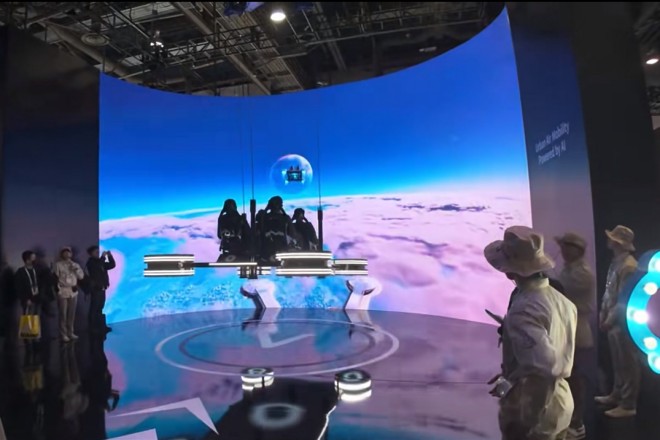
- 可变形显示屏 柔性LED显示屏:
柔性LED屏是一种可以弯曲变形的显示屏,可以根据展馆或游乐设施的需要改变形状,如波浪形、球形、花朵形等。
这种可变形的展示方式,不仅增加了展馆或游乐设施的趣味性和可玩性,还凸显了展品的特色和主题。
例如在模拟海洋世界的场景中,可以利用柔性LED屏来模拟海浪的起伏、波动;在模拟未来科技城的场景中,可以利用柔性LED屏来模拟未来建筑的形态和变化效果。
- 激光投影与LED屏幕的组合:
激光投影技术是一种能够投射高质量图像的技术,将激光投影技术与LED屏幕相结合,可以创造出更加丰富的视觉效果和互动体验。
例如在模拟音乐会或演唱会的场景中,可以利用激光投影技术,将音符、乐谱等元素投射到LED屏幕上,并利用手势识别等技术让参观者与屏幕进行互动。
这样的组合不仅提供了视觉的享受,也增加了游客的参与度和互动性。
- 折叠LED屏应用领域:
折叠LED屏是一种可以折叠、展开的显示屏形式,可以根据不同展示区域的需求,灵活展开、折叠,变换显示内容。
这样的设计不仅方便布置运输,还能在展览过程中快速更换展示内容,增加观众的观看体验。例如在模拟历史长河的场景中,可以利用折叠式LED屏幕展示不同历史时期的事件和人物。
模拟未来科技城的场景,可以利用折叠LED屏幕展示未来城市的规划和建设。
4). 深度解析球形LED屏,打造沉浸式空间
- 技术选择和内容创作:
球形LED屏是一种特殊的显示屏形态,能够提供全方位的视觉体验,在技术选型方面需要考虑屏幕分辨率、亮度、对比度以及驱动和控制方式等参数。
同时,还需根据球形屏的特点设计制作360度视频及定制化内容,这些内容可以包括各类场景模拟、角色扮演、互动游戏等,丰富游客的观看体验。
- 360度视频及定制内容制作:
为了充分利用球形LED屏的特点,需要制作360度视频以及定制内容。
这些视频和内容需要考虑到球形屏幕的全方位视角和立体感,以保证游客在观看时能够获得最佳的视觉体验。
在制作过程中需要注意视频分辨率、帧率等参数,以及内容的连贯性和趣味性,才能吸引游客的注意力和兴趣。
- 互动设计与观众参与度提升:
球形LED屏的交互设计需要考虑观众的操作方式和反馈机制。
例如,可以设计多种操作方式,如触摸屏、语音识别、手势识别等,让观众与屏幕进行互动,并通过声音、灯光等反馈机制增强观众的沉浸感和参与感。
同时还可以设置一些互动游戏或者挑战任务,让观众在参与过程中获得更丰富的体验和成就感。
- 灯光和音响系统的协调:
为了营造更加真实的沉浸式空间效果,需要灯光、音响系统的配合。
灯光系统可根据屏幕上的内容改变颜色、亮度等参数,营造相应的氛围;音响系统可根据屏幕上的音效播放相应的音频内容,增强听觉体验。
通过灯光、音响系统的配合,营造出立体的效果,增强整个沉浸式空间的真实感和吸引力。
这样的配合不仅增加了游客的沉浸感和真实感,也提升了整个游乐设施或展馆的观赏价值和吸引力。
3. 成功案例分享:沉浸式主题公园典范
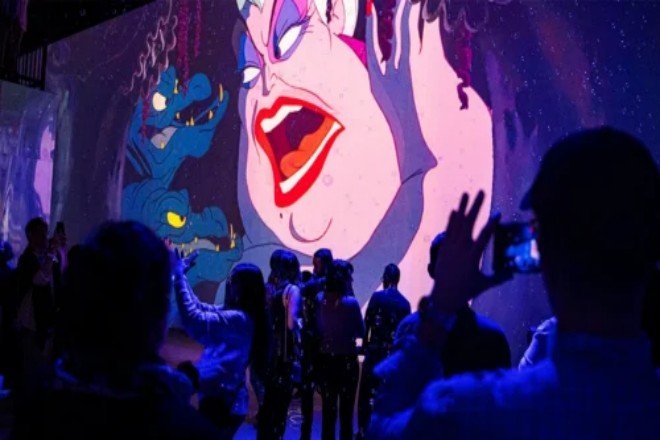
1). 上海迪士尼乐园
1.1).LED显示屏应用亮点:
- 场景创建:
在上海迪士尼乐园中,LED显示屏被广泛用于场景营造。
从城堡璀璨的夜景到各个主题区域的氛围灯光,LED显示屏以其高亮度、高对比度、丰富的色彩表现力为游客营造出一幕又一幕梦幻的场景。
- 互动体验:
园区内的互动游戏和表演项目也充分利用了LED显示技术。
例如在一些游乐项目中,LED显示屏作为背景或互动界面,与游客的动作、表情进行实时互动,增强游客的参与感和体验感。
1.2).学习要点:
- 技术创新:
上海迪士尼乐园通过不断的技术创新,将LED显示技术与乐园主题、场景设计紧密结合,为游客带来前所未有的沉浸式体验。
- 细节控制:
乐园在LED显示屏的选择、布置、调试上都投入了大量的心血,确保每一个细节都能完美呈现,为游客营造一个连贯、真实的沉浸式世界。
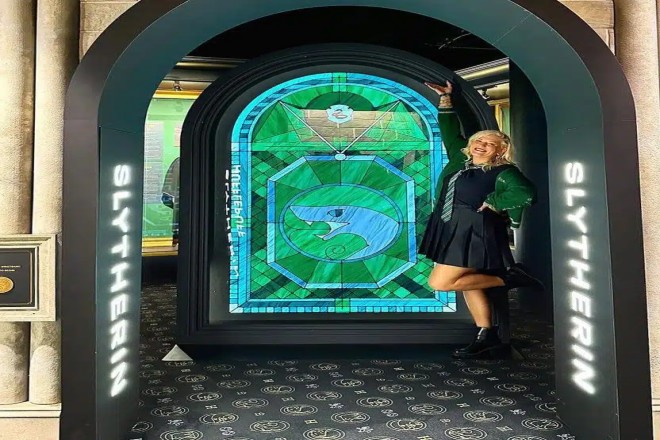
2). 日本环球影城
2.1).LED显示屏应用亮点:
- 高科技集成:
在“哈利波特的魔法世界”主题区,LED显示屏与AR、VR等高科技手段相结合,为游客提供更加真实、震撼的沉浸式体验。
例如,当游客参观霍格沃茨城堡时,LED显示屏模拟的夜空、星光与AR技术相结合,让游客仿佛置身于真实的魔法世界。
- 情感共鸣:
乐园通过LED显示屏展现的经典人物、场景激发游客的情感共鸣,如飞天扫帚飞行项目中,LED显示屏模拟的飞行场景和背景音乐让游客仿佛真的在魔幻世界中飞翔。
2.2).学习要点:
- 多维整合:
日本环球影城USJ通过LED显示屏及多种高科技手段的融合,为游客营造更加立体、丰富的沉浸式体验。
- 情感联系:
乐园通过LED显示屏展现的经典人物、场景,不仅让游客在视觉上得到满足,更能在情感上与人物产生共鸣,提升游客的忠诚度和满意度。
结论
综上所述,LED显示屏作为沉浸式主题公园的核心技术之一,不仅极大地丰富了游客的视觉体验,还通过其高互动性、定制化内容为公园带来了前所未有的吸引力和竞争力。
随着技术的不断进步和创意设计的不断深入,LED显示屏在沉浸式体验中的应用将更加广泛,从单一的视觉展示,到多感官融合的全方位体验。
每一次技术飞跃都拓宽了沉浸式娱乐的边界。
最后,如果你想了解更多关于LED显示屏的信息, 请与我们联系。
